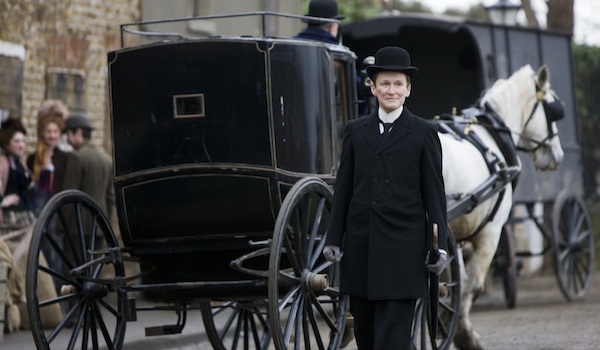Albert Nobbs Review
It took Glenn Close almost two decades to get Albert Nobbs to the big screen, and for such a talent to dedicate so much heart and soul to something, viewers have a right to expect something truly special, right? Well, if you go in with that mindset, you’ll certainly be disappointed. However, those who can forget what they’ve heard about this film—both the good and the bad—and can just sit back and watch what unfolds are in for a nice time. Too often, Albert Nobbs falls into melodramatic traps, yet two stellar performances—including Close’s—managed to keep my attention and interest long enough that I can give the film a solid recommendation.
Close plays the titular character, a hotel waiter in late-19th-century Ireland. Yes, that’s “waiter,” not “waitress.” Close plays a woman leading the life of a man. With no family, money, or real skills to fall back on, Albert decides his best chance to get ahead in life is as a man. No one he knows seems to think twice about his gender, with the exception of Hubert Page (Janet McTeer), a painter who discovers Albert’s secret when staying in his room one night. Hubert, however, has something in common with Albert—he too is leading the life of a man, albeit for different reasons. But Hubert’s story gives Albert hope. If he can lead a happy life and get married, so can Albert. So he sets his sights on the prettiest hotel maid, Helen (Mia Wasikowska), and decides he’ll spend all the money he’s saved on a storefront where he can sell tobacco. The only thing standing in his way is Helen’s relationship with another—much younger and more passionate—hotel worker, Joe (Aaron Johnson).
Albert is a very tragic character. We sympathize with him because he so quietly goes about his business. Yet, it’s always in the back of your mind that his dreams can’t and won’t become a reality—at least not in the perfect way he envisions them. Part of that has to do with Helen, one of the most vain women I’ve seen on film in some time. But the other part has to do with Albert himself. You get the sense that he’s incapable of truly fighting for what he wants, and after Helen steps all over him the first, second, third time, it becomes clear the ending to this story won’t necessarily be a happy one.
When the film focuses on Albert or Hubert it’s quite successful. The politics of gender are generally glossed over. The appeal, rather, is on a more human level. Hubert, in particular, is a very vivid character. Seeing him come down a few pegs from his usual confident self late in the film is quite moving. I just wish we got more of him and less of Helen and Joe. Wasikowska and Johnson give subpar performances, and their melodramatic, on-again-off-again romance just distracts and pads the film’s running time.
Glenn Close’s Oscar chances will likely determine if people actually see this film. I’m 50/50 on whether she gets at this point, but it’s hard to argue that she doesn’t deserve a nod. She might not be the most convincing man, but she’s a very convincing transgender. She has all the mannerisms down. What doesn’t always work in her favor, however, is the screenplay, which is full of some clunky pieces of dialogue. I’ve already extolled the virtues of McTeer’s work (she, too, could get a call on nomination morning). The other great piece in the acting trifecta here is Brendan Gleeson (coming off a sensational turn in The Guard), whose role is small but funny and definitely memorable.
Albert Nobbs features a very solid score and some good-looking sets. Ultimately, director Rodrigo Garcia (who you might be familiar with from 2010’s Mother and Child) is more concerned with interpersonal dynamics than developing really resonant themes. And that approach certainly holds the film back to a degree. But despite that, I found myself taken at times with this story. I liked Albert Nobbs, perhaps more than I should have. It’s far from groundbreaking, but it hits far more often than it misses.
















